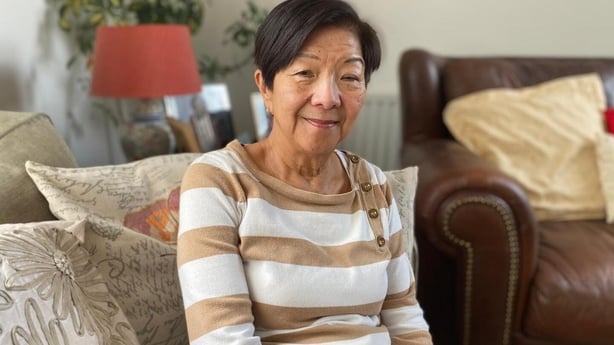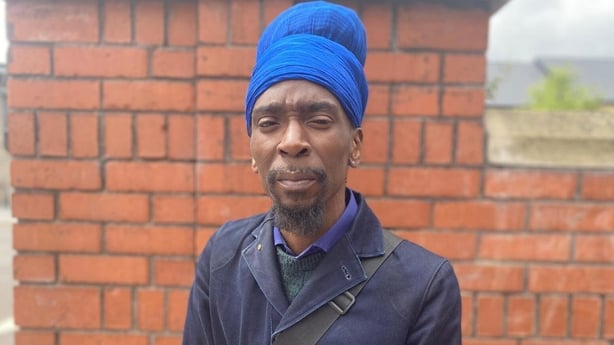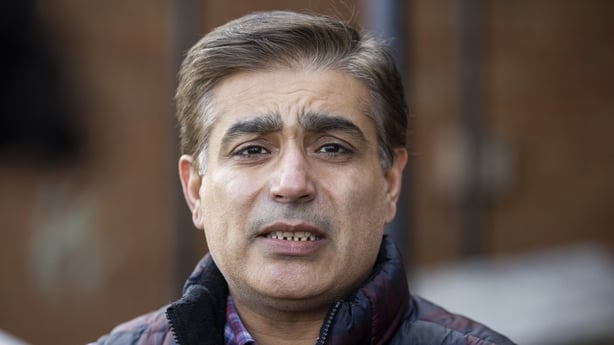When Hong Kong-born Anna Lo arrived in Northern Ireland in 1974, she stood out.
"In '74, there were very few foreigners or tourists in Belfast or Northern Ireland. I remember walking down the street one day, and you could feel that people, someone was looking at you. And then I looked round. It was a bus passing, a double decker bus. And I could see all the people looking round at me."
For much of the North's history, there were few people from ethnic minority backgrounds. But since the peace agreement in 1998, that has been steadily changing.
The 2001 census showed 1.8% of the population were born outside the UK or Ireland. In 2021, that figure was 6.5%.
The most recent statistics from the NI Statistics and Research Agency show that last year net migration to Northern Ireland reached its highest level in 15 years.
The figures are lower than the UK or Republic of Ireland, but with new languages, cuisine and culture, new arrivals have made an impact in areas like South Belfast. Ms Lo represented the area as an MLA from 2007 to 2014. She was Northern Ireland’s first elected representative from an ethnic minority background.
She had joined the cross-community Alliance party.

As someone with no ties to either a nationalist or unionist tradition, this made sense to her. She still thinks more people from an ethnic minority background getting into politics in the North will help dilute some sectarian attitudes.
Ms Lo said she was respected by her political peers, but did receive some racist abuse from members of the public.
"From the moment the Alliance party announced I was standing, there were lots and lots of emails, telephone calls, letters, social media, saying how dare I, someone not born in Northern Ireland to represent people of South Belfast."
Ms Lo became somewhat disillusioned and stood down in 2014.
She was nearing retirement, but at the time she attributed her decision to quit politics to racism.
"It was a difficult time, because I saw a rise in racist attacks, and it worried me and upset me. I was disappointed and sad about, not much was done or improved in the lives of ethnic minority people".
Ten years on, Ms Lo feels not enough progress has been made. There have been no other MLAs from an ethnic minority background.
We need your consent to load this rte-player contentWe use rte-player to manage extra content that can set cookies on your device and collect data about your activity. Please review their details and accept them to load the content.Manage Preferences
However, in 2023 Lilian Seenoi-Barr was elected as an SDLP councillor and in doing so became the first black politician to be elected to public office in Northern Ireland.
In 2024, she was selected as Mayor of Derry City and Strabane.
Born in Kenya, Seenoi-Barr arrived in the North 14 years ago as a refugee.
"I think since I got involved in politics, I don't believe for a second people look at the colour of my skin.
"I think they look at the substance of what I can contribute to this," she said.
Ms Seenoi-Barr said she has received racial abuse on social media but is "immune" to it, because she does not pay any attention to it.
"I have to say I was glad it happened to me for two main reasons - I can handle it, and it exposes what we have always been saying as a community that racism exists, hate exists, and maybe now those who are in power can do something about it."
She thinks the focus of politics and policymaking on orange and green issues has meant the needs of ethnic minorities and other communities have been overlooked.
"I think we really do need more people from minoritised communities getting into politics to really start focusing on real issues.
"That's the impact our community will have in politics in Northern Ireland. Changing that narrative that it's no longer about the orange and green, it is about the real issues that affect people."
Ms Seenoi-Barr is in a nationalist political party and thinks people from a migrant background in the North would be better off in a united Ireland.
"I do really think that we will be the dealbreakers here, and I strongly believe in that. First, we do have our own affiliations in terms of political ideologies.
"Many of the people who come from Africa, for example, come from a colonised background.
"We believe in self-determination like everyone else, we believe in self-governing like everyone else.
"But I do think to influence the constitutional makeup of this country, will solely be made on social issues that affect people. It's not because of the identity politics.
"People will be looking at the practical issues that affect them."
Apart from politics, there are other areas of public life that so far do not reflect the changing demographics of the north.
Within the Police Service of Northern Ireland (PSNI), just 0 .5% of the workforce come from an ethnic minority background.
Andy George is one of those officers. He is a serving Chief Inspector and is president of the National Black Police Association, a UK-wide organisation.
He thinks there has been an "erosion of confidence" in the police among ethnic minority communities in the North since the Black Lives Matter protests.
In June 2020, there were protests in Derry and Belfast to show support for the Black Lives Matter movement.
Police warned fines could be issued for breaking Covid-19 regulations.
Around 70 penalty notices were issued and 14 people were reported to the Public Prosecution Service.
The PSNI later apologised after the police watchdog in the North found the handling of the protests was "unfair" and "discriminatory".
"I labeled the Police Service of Northern Ireland as institutionally racist in December 2020, and unfortunately that would still be my position," he said.
"We still see that institutional racism, which doesn't mean that every officer is racist and again, that the definition isn't always clearly set out, but it means that the systems, processes and practices of the police service don’t always take into account what ethnic minority communities think, feel or need."
The PSNI says it has invested in engaging with the ethnic minority communities over the past few years to improve confidence.
It says the force seeks to foster trust, tackle discrimination and promote justice and good relations and will be launching a Race and Ethnicity action plan soon.
Mr George is also concerned about the rise in racially motivated crimes.
The PSNI says the number of reported racially motivated incidents in 2024 has risen by a third, hitting a record high.
A number of years ago racially motivated incidents overtook those with a sectarian motive, and the trend has continued.
Takura Makoni, policy officer with the African and Caribbean Support Organisation, said he has been targeted "many times" over his 24-years in Northern Ireland.
He said he speaks about the most recent incident to raise awareness of the issue and the impact it can have on everyone in society.

Earlier this year, Mr Makoni spoke out publicly when anti-immigrant signs were put up around the area of Belfast he was living in.
His home was then sprayed with hate-motivated graffiti, and he subsequently moved out.
Police became involved, but Mr Makoni says lots of racially motivated incidents are going unreported.
"I've had instances where things happen when you ask yourself, well the amount of time and energy it's gonna take me to report this, and nothing's gonna be done.
"What is really the point? And many people do that. Far, far more than the statistics would indicate."
The clearance rate for race hate crime is low, just over 10%.
"There is a very cavalier attitude to hate crimes in this country. It beggars belief," he said.
"I would like to see people not tolerating this kind of thing when it happens to people, because it's become a tradition to, after the fact, everybody comes on and says how sorry they are and how bad it is, and how these people don't represent. But when it's happening, people are quiet, and people carry on about their business and act like nothing at all is happening."
In August 2024, an anti-immigration protest in Belfast erupted into violent disorder.
Houses were targeted and businesses were burned down in what police have described as hate crimes.
There had been violent disorder across the UK after three young girls were killed in Southport, and there were false claims on social media that someone who had arrived in the UK illegally was to blame.
PSNI Assistant Chief Constable Melanie Jones said paramilitary groups were involved in the disorder in Belfast.
To date, 49 people have been arrested and 39 charged. Nine of those charged are young people under the age of 18.
Muhammad Atif, trustee with the Belfast Multi-Cultural Association, said the ethnic minority community was living in fear.
"My kids didn't go out for about 10 days. They didn't leave the house.
"My wife didn't even go to get a bottle of milk from Tesco because she was scared. I knew a lot of families, they didn’t even turn on the lights at night because they were scared.

"I think the bigger part here is the politicians in the country. Their message was too late and too little. They waited until the worst was over to show the support."
Mr Atif said he has noticed politicians are now paying more attention to his community.
"The vote of ethnic minorities, they are probably the game changers in any possible referendum.
"When you have half of the population on one side and half on the other side and there is in the middle 5-6 percent, the minute they participate, they shift the weight of whatever is happening.
"I've been contacted by different parties, I can't really name them here, but I've been contacted, I've been offered different positions.
"My struggle was that now they've realised, and now they want to sell a brown face. To get more votes. Where were they in the last 20 years? Where were they five years ago, 10 years ago? Why now?
"But I do see, I think things will change now in politics, ethnic minorities will have a very, very good role to play."
Our Lives in the North is a six-part podcast series from RTÉ Radio 1, available on the RTÉ radio app or wherever you get your podcasts.







